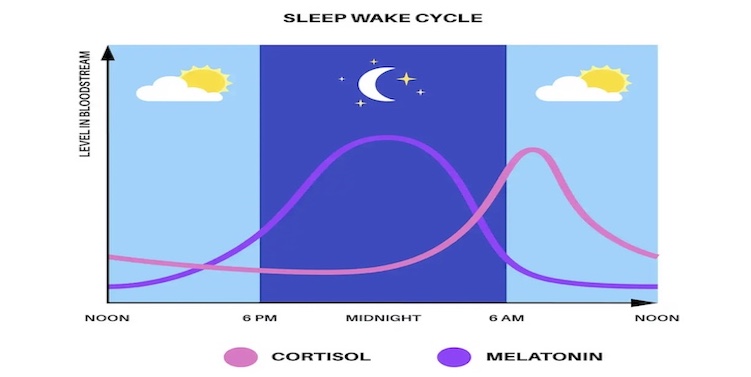
Written by Jennifer Cox LCPC
One of the best ways to get the most out of your health and vitality is to work with, not against, your natural biological clock, especially the circadian rhythm (your sleep cycle). This rhythm regulates melatonin which is your sleep hormone and cortisol which is your body’s anti-stress hormone.
Cortisol levels affect how alert you are during the day. It rises and falls at different times of the day in order to give you that awake feeling or allows you to rest/relax.
Melatonin levels affect your mood and sleep. The production and release of melatonin in the brain is connected to the time of day, increasing at night to help us sleep.
When melatonin increases, cortisol levels drop, and when cortisol levels rise, melatonin starts to go down – That’s why when stressed or anxious, you can’t sleep.
This cycle coordinates our physiology – We are meant to be awake, active, and consuming food during the daylight hours (the active phase of the circadian rhythm) and asleep when it is dark. Going against our natural biological rhythms may result in chronic overall (physical and mental) health issues.
Some signs that your rhythm may be off:
- Chronic fatigue, low energy, daytime sleepiness
- Trouble falling or staying asleep
- Poor immunity
- Impaired judgment
- Mood disorders (depression, anxiety, etc.)
- Digestive distress and dysfunction
- Body aches
- Low libido
- Obesity
Some ways to get your rhythm back on track:
-Consistent sleep schedule.
-Have a relaxing bedtime routine such as journaling, yoga, tea, warm bath/shower, etc.
-Exercise daily, but try not to do hours before bed.
-Get outside, especially right after you wake up.
-Avoid electronic use at least an hour before bed.
-Consider your eating habits. Eating at regular intervals can help keep blood sugar balanced.
-Limit any drinking a couple hours before bed to avoid having to get up in the middle of the night to go to the bathroom. Also, it is recommended no caffeine in the late afternoon/early evening.
-Use your bed for sleep. Our brains make automatic associations between locations and emotions. For example, if you are stressed and working on your laptop in bed, then your bed will ultimately become associated with stress, making it more difficult to fall asleep. Another thing to consider, if you’re not able to fall asleep after 20-30 minutes, get up and do something else for a few minutes. Don’t give your body and mind a reason to associate the bed with wakefulness.
https://www.ncbi.nlm.nih.gov/pmc/articles/PMC7830980/

